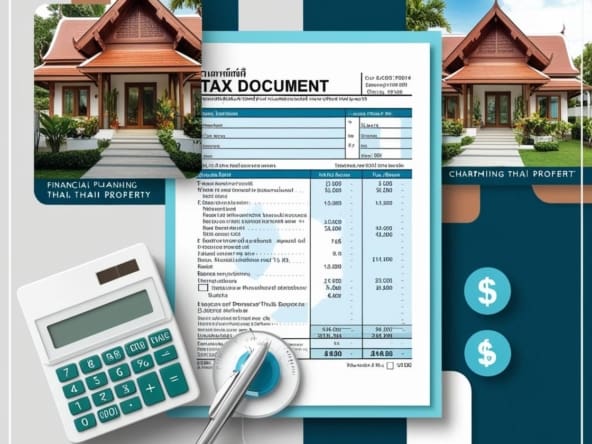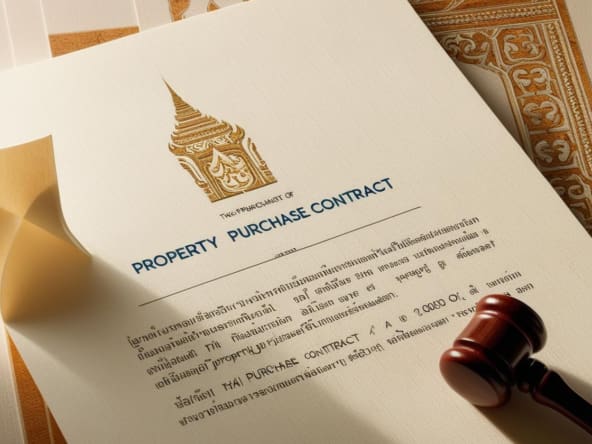Investing in property in Thailand can be an exciting venture, but understanding how to finance your purchase is crucial. This guide explores the various options available for financing your property in Thailand, including mortgages from local banks, foreign bank options, and alternative financing methods. Whether you’re a first-time buyer or an experienced investor, knowing your financing options will help you make informed decisions.
Understanding the Thai Property Market
Before diving into financing options, it’s essential to have a clear understanding of the Thai property market. Thailand’s real estate landscape offers a variety of properties, from luxurious beachfront villas in Phuket to urban condominiums in Bangkok. Prices can vary significantly based on location, type of property, and market conditions. For example, as of 2023, average condominium prices in Bangkok hover around THB 110,000 per square meter (approximately USD 3,300), while luxury villas in Phuket can exceed THB 280,000 per square meter (USD 8,400).
Familiarizing yourself with current market trends, such as demand shifts and price fluctuations, will help you determine how much you need to borrow and what types of financing options are available.
Financing Options for Property in Thailand
1. Mortgages from Thai Banks
Local Banks: Many local banks in Thailand offer mortgage loans to both Thai citizens and foreigners. However, the process may vary, and not all banks have the same lending criteria. Here are some key points to consider when financing your property in Thailand through local banks:
- Eligibility: Generally, foreign buyers can secure a mortgage of up to 70-80% of the property’s appraised value. Banks may require that the buyer has been residing in Thailand for a certain period or holds a work permit. Additionally, some banks may ask for a local bank account and proof of income in Thailand.
- Interest Rates: Interest rates for mortgages in Thailand typically range from 5% to 7%, depending on the bank and loan terms. It’s crucial to shop around and compare rates to get the best deal. Additionally, some banks offer fixed rates for the first few years, followed by a floating rate, which can help in budgeting for your payments.
- Loan Terms: Most banks offer mortgage terms ranging from 10 to 30 years. Longer terms usually come with lower monthly payments but may result in paying more interest over the life of the loan. It’s important to consider your long-term plans and financial stability when choosing the loan duration.
- Documentation: Expect to provide various documents, including proof of income, tax returns, a valid passport, and proof of residency. Some banks may also require a letter of employment. Additionally, having a local Thai-speaking representative can facilitate communication and document processing.
2. Financing from Foreign Banks
For expatriates or foreign buyers, financing through a foreign bank may be a viable option. Some international banks have branches in Thailand and can offer mortgages to non-residents.
- Requirements: Foreign banks may require more extensive documentation, including proof of income and assets from your home country. They may also have different lending criteria compared to local banks, which can affect your borrowing capacity.
- Currency Considerations: Be mindful of currency exchange rates and the possibility of needing to repay the loan in a currency other than Thai Baht. This can affect your overall repayment amount and expose you to exchange rate fluctuations. It’s advisable to evaluate your exposure and consider options like currency hedging if applicable.
3. Developer Financing
Some property developers in Thailand offer financing options directly to buyers, especially for new developments. This can be an attractive option for investors looking to purchase off-plan properties.
- Flexible Terms: Developer financing often includes flexible payment plans that can make it easier for buyers to manage their cash flow. This can include lower down payments or extended payment periods during the construction phase, which can ease the initial financial burden.
- Incentives: Developers may provide incentives such as lower interest rates or additional discounts if you choose to finance through them. It’s worth negotiating these terms, as they can significantly affect the overall cost of your investment.
4. Alternative Financing Options
In addition to traditional mortgages, there are alternative financing options available:
- Personal Loans: If you need a smaller amount, personal loans from local banks or credit unions may be an option. However, these loans typically have higher interest rates and shorter repayment terms compared to mortgages. Personal loans can be beneficial for covering initial costs, renovations, or furnishing your new property.
- Peer-to-Peer Lending: Emerging platforms allow investors to lend money directly to borrowers, bypassing traditional banks. This option may provide competitive interest rates but comes with higher risks, including the possibility of default.
- Investment Partnerships: Consider teaming up with other investors to pool resources. This strategy can help you manage the financial burden and share the risks associated with property investment. Partnerships can also provide access to larger properties or developments that might be out of reach individually.
Factors to Consider When Financing Property
1. Down Payments
The required down payment for a mortgage in Thailand typically ranges from 20% to 30% of the property’s value, depending on the lender. It’s essential to budget for this upfront cost when considering your financing options. Some developers may offer lower down payment options to make purchases more accessible, especially in new developments.
2. Currency and Exchange Rates
If you’re a foreign buyer financing through a local bank, keep in mind that currency exchange rates can impact your monthly payments. Fluctuations in exchange rates may increase your repayment amounts if you earn in a different currency. It’s important to factor this into your overall financial planning and consider strategies to mitigate risks.
3. Loan Terms and Conditions
Read the fine print of any mortgage agreement. Understand the terms, including interest rates, payment schedules, penalties for early repayment, and what happens if you default. Each lender may have different policies that can significantly affect your financial commitments.
4. Legal Considerations
Ensure you understand the legal implications of financing your property in Thailand. It’s advisable to engage a local lawyer who specializes in real estate transactions to help you navigate the legal landscape, review contracts, and ensure compliance with local laws. Having legal support can help prevent potential disputes and safeguard your investment.
5. Financial Stability
Assess your financial situation before committing to a mortgage. Consider factors like job stability, other debts, and your long-term financial goals. It’s essential to have a clear picture of your budget and how much you can comfortably afford to borrow. Additionally, maintaining a healthy credit score will improve your chances of securing favorable loan terms.
Conclusion
Financing your property in Thailand requires careful consideration and planning. Understanding the various options available, including local bank mortgages, foreign bank loans, developer financing, and alternative methods, will empower you to make informed decisions.
Always conduct thorough research, consult with local experts, and stay informed about the evolving property market. With the right financing strategy, you can successfully navigate the Thai property market and achieve your real estate investment goals.



